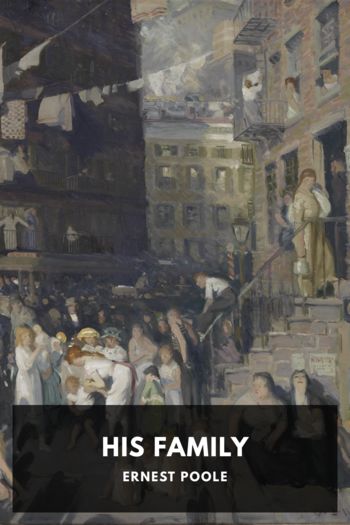His Family - Ernest Poole (ereader for comics .txt) 📗

- Author: Ernest Poole
Book online «His Family - Ernest Poole (ereader for comics .txt) 📗». Author Ernest Poole
“What happened?” Roger asked her.
“His girl took up with another man, and Joe has hot Italian blood. He got drunk one night and—shot them both.” There was another silence. “I did what I could,” she said harshly, “but he had a bad record behind him, and the young assistant district attorney had his own record to think of, too. So Joe got a death sentence. We appealed the case but it did no good. He was sent up the river and is in the death house now—and he sent for me to come today. His letter hinted he was scared, he wrote that his priest was no good to him. So I went up this afternoon. Joe goes to the chair tomorrow at six.”
Deborah went to the sofa and sat down inertly. Roger remained motionless, and a dull chill crept over him.
“So you see my work is personal,” he heard her mutter presently. All at once she seemed so far away, such a stranger to him in this life of hers.
“By George, it’s horrible!” he said. “I’m sorry you went to see the boy!”
“I’m glad,” was his daughter’s quick retort. “I’ve been getting much too sure of myself—of my school, I mean, and what it can do. I needed this to bring me back to the kind of world we live in!”
“What do you mean?” he roughly asked.
“I mean there are schools and prisons! And gallows and electric chairs! And I’m for schools! They’ve tried their jails and gallows for whole black hideous centuries! What good have they done? If they’d given Joe back to the school and me, I’d have had him a fireman in a year! I know, because I studied him hard! He’d have grown fighting fires, he would have saved lives!”
Again she stopped, with a catch of her breath. In suspense he watched her angry struggle to regain control of herself. She sat bolt upright, rigid; her birthmark showed a fiery red. In a few moments he saw her relax.
“But of course,” she added wearily, “it’s much more complex than that. A school is nothing nowadays—just by itself alone, I mean—it’s only a part of a city’s life—which for most tenement children is either very dull and hard, or cheap and false and overexciting. And behind all that lie the reasons for that. And there are so many reasons.” She stared straight past her father as though at something far away. Then she seemed to recall herself: “But I’m talking too much of my family.”
Roger carefully lit a cigar:
“I don’t think you are, my dear. I’d like to hear more about it.” She smiled:
“To keep my mind off Joe, you mean.”
“And mine, too,” he answered.
They had a long talk that evening about her hope of making her school what Roger visaged confusedly as a kind of mammoth home, the center of a neighborhood, of one prodigious family. At times when the clock on the mantle struck the hour loud and clear, there would fall a sudden silence, as both thought of what was to happen at dawn. But quickly Roger would question again and Deborah would talk steadily on. It was after midnight when she stopped.
“You’ve been good to me tonight, dearie,” she said. “Let’s go to bed now, shall we?”
“Very well,” he answered. He looked at his daughter anxiously. She no longer seemed to him mature. He could feel what heavy discouragements, what problems she was facing in the dark mysterious tenement world which she had chosen to make her own. And compared to these she seemed a mere girl, a child groping its way, just making a start. And so he added wistfully, “I wish I could be of more help to you.” She looked up at him for a moment.
“Do you know why you are such a help?” she said. “It’s because you have never grown old—because you’ve never allowed yourself to grow absolutely certain about anything in life.” A smile half sad and half perplexed came on her father’s heavy face.
“You consider that a strong point?” he asked.
“I do,” she replied, “compared to being a bundle of creeds and prejudices.”
“Oh, I’ve got prejudices enough.”
“Yes,” she said. “And so have I. But we’re not even sure of them, these days.”
“The world has a habit of crowding in,” her father muttered vaguely.
Roger did not sleep that night. He could not keep his thoughts away from what was going to happen at dawn. Yes, the city was crowding in upon this quiet house of his. Dimly he could recollect, in the genial years of long ago, just glancing casually now and then at some small and unobtrusive notice in his evening paper: “Execution at Sing Sing.” It had been so remote to him. But here it was smashing into his house, through the life his own daughter was leading day and night among the poor! Each time he thought of that lad in a cell, again a chill crept over him! But savagely he shook it off, and by a strong effort of his will he turned his thoughts to the things she had told him about her school. Yes, in her main idea she was right. He had no use for wild reforms, but here was something solid, a good education for every child. More than once, while she had talked, something very deep in Roger had leaped up in swift response.
For Deborah, too, was a part of himself. He, too, had had his feeling for humanity in the large. For years he had run a boys’ club at a little mission school in which his wife had been interested, and on Christmas Eve he had formed the habit of gathering up a dozen small urchins right off the street and taking them ’round and fitting them out with good warm winter clothing, after which he had gone home to help Judith trim the Christmas tree and fill their





Comments (0)